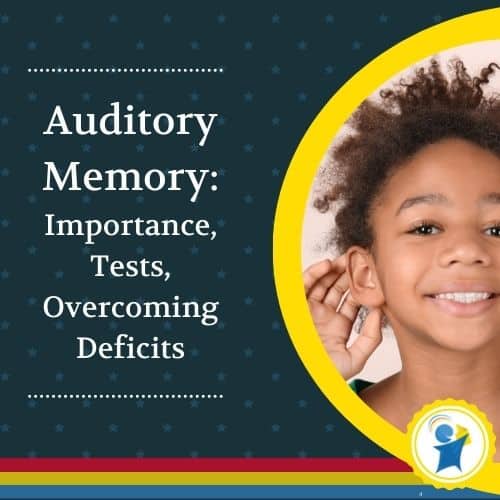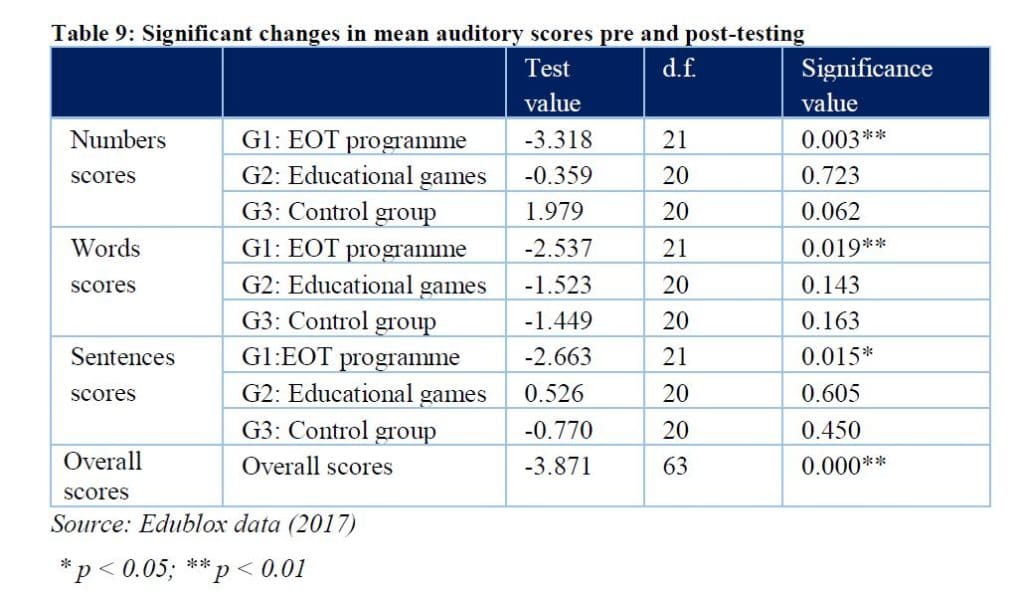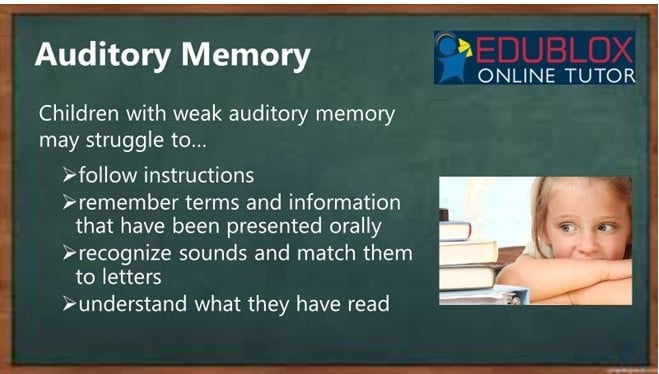
Memory is the process by which knowledge is encoded, stored, and later retrieved. Although the word memory may conjure up an image of a singular, “all-or-none” process, it is clear that there are many kinds of memory, each of which may be somewhat independent of the others. Learn more about auditory memory.
Table of contents:
- What is auditory memory?
- Why auditory memory matters
- Test your child’s auditory memory
- How Edublox can help
What is auditory memory?
Auditory memory involves taking in information that is presented orally, processing that information, storing it in one’s mind, and then recalling what one has heard. Basically, it involves the skills of attending, listening, processing, storing, and recalling.
The frustration of talking to children where information goes “in one ear and out the other” is familiar to teachers and parents. But for children with poor auditory memory, this statement is pretty close to the truth, and this weakness can have severe consequences in learning.
Why auditory memory matters
If a child struggles with auditory memory, they may find it difficult to follow instructions and pay attention. Because children with auditory memory weaknesses pick up only bits and pieces of what is being said in class, they make sense of only a little of what the teacher says. Afterward, they can recall only a small amount or none of what was said.
Students with auditory memory deficiencies will often experience difficulty developing a good understanding of words, and remembering terms and information presented orally, for example, in history and science classes.
A study by Tirosh and Cohen (1998) found that auditory short-term memory was significantly related to ADHD and language problems.
Riccio and team (2007) compared the learning and memory in children with Specific Language Impairment (SLI) to 30 normally functioning children on the Children’s Memory Scale. Results indicated that children in the SLI group exhibited significantly lower scores on auditory indices and subtests than the control group. In contrast, no between-group differences emerged for the visual indices and subtests.

Auditory memory also plays a crucial role in literacy: it is one area of auditory processing that directly impacts reading, spelling, writing, and math skills.
Kurdek and Sinclair (2001) measured auditory memory in kindergarteners and found that readiness in auditory memory predicted later reading and mathematics achievement in fourth grade.
Children with poor auditory memory skills may struggle to recognize sounds and match them to letters – a common symptom of a reading disability or dyslexia.
Research by Plaza et al. (2002) found that dyslexic children exhibited a significant deficit in tasks involving auditory memory skills (digit span, unfamiliar word repetition, sentence repetition) compared with their age-mates.
Weiss et al. (2014) tested dyslexic and non-dyslexic musicians on auditory processing and auditory memory. Dyslexic musicians scored as well as their non-dyslexic counterparts in auditory processing tasks and better than the general population. However, they performed much worse on tests of auditory working memory, including memory for rhythm, melody, and speech sounds. Moreover, these abilities were intercorrelated and highly correlated with their reading accuracy, which means that the dyslexic musicians with the poorest auditory working memory tended to have the lowest reading accuracy.
“Auditory memory is probably the most prevalent but most often overlooked learning skill deficiency,” says educational therapist Addie Cusimano (2010). “Throughout my years of testing, I have found a higher percentage of students with weaknesses in the auditory memory areas than any other learning skill area, even among those students whom we would not classify as learning disabled. In addition, most children who have attention deficit disorders and/or hyperactivity have serious auditory memory deficiencies. These children are desperately in need of remediation in the auditory skill areas.”
Test your child’s auditory memory
Digit span is a standard measure of short-term memory, i.e., the number of digits a person can absorb and recall in correct serial order after hearing or seeing them. As is usual in short-term memory tasks, the person has to remember a small amount of information for a relatively short time, and the order of recall is important.
To test the auditory digit span of a child, say numbers slowly in one-second intervals in a monotone voice. Say, for example, 6-1-5-8 and have the child repeat it back. If they can, then say 9-2-4-7-5. The child must be able to repeat a 4-digit sequence back correctly 75% of the time on the first try to be considered at a short-term memory of 4; it is the same for each higher digit.
A two-year-old should have a short-term memory of 2, a three-year-old of 3, a four-year-old of 4, et cetera, up to seven years old. The average in our society for a seven-year-old to adult is 7.
According to neurodevelopmentalist Cyndi Ringoen, to begin to utilize phonics beyond memorizing a few individual sounds, a child must have an auditory digit span close to 6. If a child’s digit span is below 6, you will see a child, depending on how many drills they have had, who can say all the sounds of the phonemes and possibly put a few together into words, but at the end of the sentence or paragraph cannot understand what they have just read.
How Edublox can help
Edublox specializes in educational interventions that make children smarter, help them learn and read faster, and do math with ease. Our programs enable learners to overcome reading difficulties and other learning obstacles, assisting them to become life-long learners and empowering them to realize their highest educational goals.
Edublox is grounded in pedagogical research and 30+ years of experience demonstrating that weak underlying cognitive skills account for most learning difficulties. Underlying cognitive skills include auditory memory. Specific cognitive exercises can strengthen these weaknesses leading to increased performance in reading, spelling, writing, math, and learning.
In a study, 64 2nd-grade students at an inner-city school were divided into three groups: group 1 consisted of 22 students who did Edublox Online Tutor (Development Tutor) for 28 hours over a period of three weeks, while group 2 consisted of 21 who played computer games, and the rest continued with school. The Test of Auditory Processing Skills (TAPS-3) was used to assess auditory memory of numbers, words, and sentences, before and after the three weeks.
Results show that the auditory memory of the Edublox group improved significantly according to a paired samples t-test:

Edublox Online Tutor has been optimized for children between 7 and 13, is suitable for the gifted and less gifted, and can be used at home and school. Our programs are effective in alleviating a variety of symptoms associated with dyslexia, dysgraphia, and dyscalculia.
.
Edublox offers cognitive training and live online tutoring to students with dyslexia, dyscalculia, dysgraphia, and other learning difficulties. Our students are in the United States, Canada, Australia, and elsewhere. Book a free consultation to discuss your child’s learning needs.
.
References:
Cusimano A. Learning Disabilities: There Is a Cure. Achieve Publications. 2010.
Kurdek LA, Sinclair RJ. “Predicting reading and mathematics achievement in fourth-grade children from kindergarten readiness scores,” Journal of Educational Psychology. Sep 2001, 93(3): 451-455.
Plaza M, Cohen H, Chevrie-Muller C. “Oral language deficits in dyslexic children: weaknesses in working memory and verbal planning.” Brain and Cognition. March 2002, 48(2-3): 505-512.
Riccio CA, Cash DL, Cohen MJ. “Learning and memory performance of children with specific learning impairment.” Applied Neuropsychology. 2007, 14(4): 255-61.
Tirosh E, Cohen A. “Language deficit with attention-deficit disorder: a prevalent comorbidity.” Journal of Child Neurology. Oct 1998, 13(10): 493-7.
Weiss, AH, Granot, RY, Ahissar, M. “The enigma of dyslexic musicians.” Neuropsychologia. Feb 2014, 54: 28-40.

